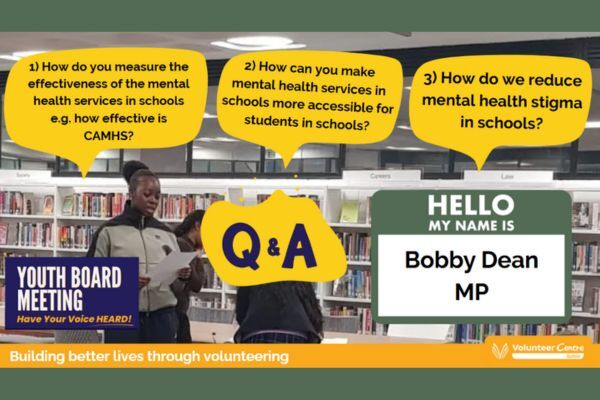
- How do you measure the effectiveness of the mental health services in schools e.g. how effective is CAMHS?
- How can you make mental health services in schools more accessible for students in schools?
- How do we reduce mental health stigma in schools?
Three things to help during exam revision period:
- A reminder of the Mental Health signposting document the Young People created last year.
- Cassim from Kooth, who we met at this Youth Board, is running a series of free online workshops on managing exam stress in mid-April. If you are interested, you can sign up using this link: Here
- We showed here how fun it is to get arty out in Sutton parks. If you want to check out something fun to break up the revision, why not have a go at submitting some art for Teen CAOS, free professional support given.
Here are the responses from Bobby Dean MP, Lucy Vento from the CAMHS team and Sara Yan from the School Nurses team.
They have asked for your ideas a young people, you can email youngcommissioners@vcsutton.org.uk if you have follow up comments and queries you want us to send them.
From Sara Yan, School Nurses team
How do you measure the effectiveness of the mental health services in schools e.g. how effective is CAMHS?
The School Nurse offers a weekly drop-in to all secondary schools. When a young person is referred to drop-in along with a frank discussion with them as to how they are feeling such as rating their mood out of 10, we also use assessment tools to identify any mental health struggles, including a Moods and Feelings questionnaire, and the Tavistock assessment for self harming. On subsequent appointments responses would be measured against those original assessments to identify if the support and strategies offered had been effective.
Also, does the young person want to come back for more appointments, as this is a strong indicator of whether they have found the school nurse input helpful.
How can you make mental health services in schools more accessible for students in schools?
It is important for young people to be able to access services without too much disruption to their day and not to have to rely on others to attend an appointment. The School Nurses drop-in is effective in this way as the School Nurses service is in school and the drop-in runs over break time so a student does not have to leave the lesson, which can often generate those awkward questions from class mates as to where they are going.
More mental health support directed to and focused on the young persons engagement rather than the parent/carer may make these services more accessible. This is best placed to be undertaken at school (unless the young person is struggling with school attendance).
How do we reduce mental health stigma in schools?
Education! Young people need to be encouraged to recognise that mental health struggles are no different to a broken arm, reflux or an ear infection. The body is unwell and needs to access support to become well again. Just as stress can cause one person to have irritable bowel and another to have headaches, it is just as likely to cause mental health difficulties in some people. Also, education about how it is all connected. Poor sleep and poor eating habits not only have an impact on your physical health such as tummy ache, it affects your mental health as well.
Positive use of social media and celebrities can be used to reduce the stigma. More and more celebrities are being open about their mental health difficulties which can show young people that: 1) they are not alone, 2) it doesn’t matter how successful you are or how much money you have, everyone can experience mental health difficulties at some point in their life.






